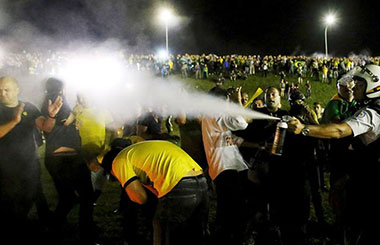Matching wits
Updated: 2016-03-21 08:35
By Raymond Zhou(China Daily)
|
||||||||
I have always believed that computers would be competent for highly convoluted tasks but would fail at childishly easy ones. Yes, it can memorize all the dictionaries in the world, but it wouldn't be able to translate very simple words and sentences.
Have you ever used a translation program lately? They tout something like 85 percent accuracy rate, which, if you think of it, would mean mistakes in almost every sentence. The most unexpected outcome is, it can turn a solemn piece of writing into an unintentionally hilarious one.
Take the English phrase "come on". There is no way a program can render it into Chinese with a satisfactory rate of correctness. English language natives may not be aware of it, but the phrase has very subtle changes in meaning, depending on the context, the tone of the speaker and other factors. In Chinese, every one of these possibilities requires a different phrase in translation.
Have you seen Chinese movie subtitles that put "Come on!" for cheering for sports games? It's because one of the dictionary definitions equate it with "Go! Go! Go!" and a computer translator functions very much like a programmer in picking what he sees as the right option.
The beauty of a human language is its ambiguity. Great literature thrives on it. When Hamlet first opens his mouth and out comes, "A little more than kin and less than kind", its meaning can be sensed but not reproduced in another language. You can try, of course, and many have. The pun implies the speaker's intuitive suspicion.
"To be or not to be" uses the simplest of English words, yet the Chinese version has to turn it into "To live or to die", which fails to recapture the elusive dichotomy of deep thinking and simple language.
Chinese, of course, is a rich language equally capable of such linguistic feats, if not more. I'll not quote the great literature of the past but trot out something funny my WeChat friends were posting today. It divides a man's life into four stages, with each one characterized by "xihuan shang yige ren". The six characters, making up four words, are exactly the same, and the trick is in the word shang and the difference in emphasis.
In the first one, it exists to smooth the tone and doesn't need to be translated. So, the phrase means "to like a person".
In stage two of a man's life, shang should be read as a verb, meaning "mount" or more specifically "copulate with".
In phase three, shang is an adjective that means "the last" or "the one before". A manifestation of midlife crisis for Chinese men is to regret that they did not get the woman who waltzed through their life without him realizing she is the one.
For the last stage, shang should be completely de-emphasized while "a" should be turned into "one". So, the sentence becomes "like to be by himself or alone".
I don't think AI can distinguish between the four meanings on paper. Even if they're read out aloud, it could be hard because some of them sound exactly alike. Next time we test an AI program, don't go for the brainy stuff. Pick something like a tongue-twister or a pun or an advertising slogan. Or have it translate a poem, which I consider the ultimate trial.
It's wonderful that machines can do more, but machines are made by man and there are creative jobs that only man can perform. Often the deceptively simple ones. For all that I know, AI may not measure up to a pet when it comes to emotionally connecting with humans.
- Top Go player ponders AlphaGo matchup
- Google's AlphaGo defeats Go grandmaster in final match
- New chips will make AlphaGo's brain obsolete
- AlphaGo defeats Lee Sedol 4-1 in historic Go match
- Baidu O2O app for food delivery is using AI, just like AlphaGo
- Lee Sedol defeats AlphaGo for 1st time in 4th Go match
- AlphaGo takes 3-0 lead in historic match with Lee Sedol

 Culture Insider: 5 things you may not know about the Spring Equinox
Culture Insider: 5 things you may not know about the Spring Equinox
 Landmarks go dark in China for Earth Hour
Landmarks go dark in China for Earth Hour
 At least five dead in tanker truck explosion in central China
At least five dead in tanker truck explosion in central China
 Brazil's Lula sworn in over protests as Rousseff faces impeachment
Brazil's Lula sworn in over protests as Rousseff faces impeachment
 Smart city: A solution to urban problems?
Smart city: A solution to urban problems?
 St. Patrick's Day celebrated around world
St. Patrick's Day celebrated around world
 Top 10 most valuable global brands
Top 10 most valuable global brands
 These university canteen dishes will blow your mind
These university canteen dishes will blow your mind
Most Viewed
Editor's Picks

|

|

|

|

|

|
Today's Top News
Chinese biopharma debuts on Nasdaq
What ends Jeb Bush's White House hopes
Investigation for Nicolas's campaign
Will US-ASEAN meeting be good for region?
Accentuate the positive in Sino-US relations
Dangerous games on peninsula will have no winner
National Art Museum showing 400 puppets in new exhibition
Finest Chinese porcelains expected to fetch over $28 million
US Weekly

|

|








